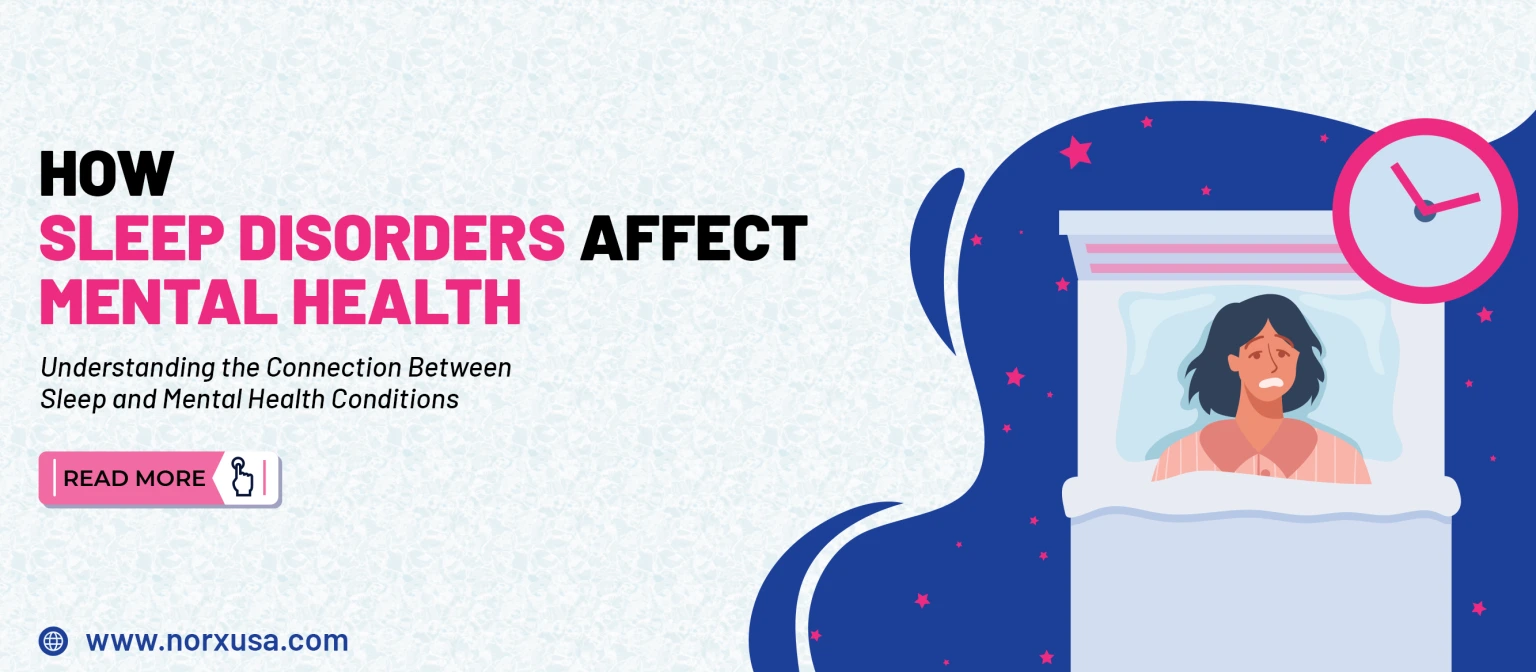
How Sleep Disorders Affect Mental Health: Understanding the Connection
In today’s hectic world, sleep often gets pushed aside for other priorities. With the rise of technology, long working hours, and constant connectivity, many individuals struggle with sleep disorders that go unnoticed or untreated. This is concerning because sleep plays a crucial role in maintaining mental health. The intricate relationship between sleep disorders and mental health is an area of increasing interest in both research and clinical practice. Understanding how sleep disorders affect mental health conditions is essential for developing effective treatment strategies and improving overall well-being.
The Science Behind Sleep and Sleep Disorders
To grasp how sleep disorders impact mental health, it’s crucial to understand the basics of sleep itself. Sleep is a complex biological process characterized by several stages, including REM (Rapid Eye Movement) and non-REM sleep. Each stage plays a specific role in physical and mental restoration:
- Non-REM Sleep: This phase includes three stages, from light to deep sleep. Non-REM sleep is vital for physical restoration, boosting the immune system, and conserving energy. Disruptions in non-REM sleep can lead to significant health problems, including mental health issues.
- REM Sleep: REM sleep, marked by rapid eye movements and vivid dreaming, is essential for cognitive functions such as memory consolidation, emotional regulation, and problem-solving. Interruptions in REM sleep due to sleep disorders can affect emotional balance and cognitive performance.
Healthy sleep cycles involve transitioning through these stages multiple times throughout the night. Disruptions in this process due to sleep disorders can lead to significant mental health consequences.
Common Sleep Disorders and How They Affect Mental Health
Several sleep disorders are prevalent, each impacting mental health in different ways. Here’s a detailed look at some of the most common sleep disorders and their effects on mental health:
- Insomnia: It means having trouble falling asleep or staying asleep, which can leave you feeling drained and struggling during the day. Chronic insomnia often coexists with depression, anxiety, and other mood disorders. The persistent lack of restorative sleep can exacerbate symptoms of these conditions, creating a vicious cycle. People with insomnia might find themselves more emotionally sensitive and have a harder time managing their mood.
- Sleep Apnea: Sleep apnea is a condition where your breathing repeatedly stops and starts while you’re asleep. This disorder often results in fragmented sleep and oxygen deprivation. Sleep apnea is linked to an increased risk of depression, anxiety, and cognitive impairments. The constant interruptions in sleep can affect overall mood and cognitive functioning, making it difficult for individuals to manage daily stressors.
- Restless Legs Syndrome (RLS): RLS causes uncomfortable sensations in the legs, leading to an uncontrollable urge to move them, usually at night. This condition can significantly disrupt sleep and is associated with an increased risk of mood disorders such as depression and anxiety. The discomfort and subsequent sleep disturbances can contribute to overall mental health deterioration.
- Narcolepsy: Narcolepsy is marked by extreme daytime drowsiness and sudden, uncontrollable sleep attacks. Individuals with narcolepsy often experience disruptions in their nightly sleep patterns and can suffer from other mental health issues, including depression and anxiety. The unpredictability of sleep attacks can lead to significant emotional and psychological stress.
- Circadian Rhythm Disorders: These disorders involve disruptions to the body’s internal clock. Conditions such as delayed sleep phase disorder (DSPD) or shift work disorder can lead to chronic sleep deprivation, contributing to mood disturbances, cognitive problems, and increased susceptibility to mental health conditions. Disrupted circadian rhythms can interfere with both sleep quality and mental health.
The Bidirectional Relationship Between Sleep Disorders and Mental Health
The connection between sleep and mental health is bidirectional, meaning that sleep disorders can lead to mental health issues, and mental health conditions can exacerbate sleep problems. Understanding this bidirectional relationship is crucial for effective treatment.
- Impact of Sleep Disorders on Mental Health: Sleep disorders can impair cognitive functions such as attention, memory, and executive function. They also affect emotional regulation, making it harder for individuals to manage stress and cope with negative emotions. For example, individuals with insomnia frequently report heightened emotional sensitivity and difficulties in mood regulation. Similarly, the fragmented sleep experienced by individuals with sleep apnea can lead to irritability and decreased motivation.
- Impact of Mental Health Conditions on Sleep: Mental health conditions often lead to sleep disturbances. Anxiety disorders may involve racing thoughts that interfere with falling asleep, while depression can result in either insomnia or excessive sleeping. Post-traumatic stress disorder (PTSD) is associated with nightmares and fragmented sleep. The complex interplay between mental health symptoms and sleep disturbances creates a challenging cycle that can be difficult to break.
Mechanisms Linking Sleep Disorders and Mental Health Conditions
Several mechanisms explain how sleep disorders can impact mental health:
- Neurochemical Imbalances: Sleep plays a crucial role in regulating neurotransmitters—chemicals that transmit signals in the brain. Sleep disorders can lead to imbalances in neurotransmitters such as serotonin, dopamine, and norepinephrine, which are essential for mood regulation. Disruptions in these neurochemical systems due to sleep disorders can contribute to the development of mental health conditions.
- Inflammatory Processes: Chronic sleep disturbances have been shown to increase levels of inflammatory markers in the body. Inflammation is a known factor in the development and progression of mental health conditions such as depression and anxiety. Sleep disorders can exacerbate inflammatory responses, further impacting mental health.
- Cognitive Functioning: Adequate sleep is essential for cognitive processes such as memory consolidation, problem-solving, and decision-making. Sleep disorders can impair these cognitive functions, leading to difficulties in managing daily tasks and increased stress levels. Cognitive impairments resulting from sleep disorders can contribute to mental health issues.
- Stress Response: Poor sleep can affect the body’s stress response system, including the hypothalamic-pituitary-adrenal (HPA) axis. Dysregulation of the stress response system is associated with various mental health conditions, including anxiety and depression. Sleep disorders can disrupt this system, leading to increased vulnerability to stress and mental health problems.
Treatment Strategies and Interventions
Addressing sleep disorders and their impact on mental health requires a multifaceted approach that includes both medical and psychological interventions:
- Medical Treatment: For many sleep disorders, medical treatments can help alleviate symptoms and improve sleep quality. This might include medications such as sleep aids or treatments specific to conditions like sleep apnea, such as Continuous Positive Airway Pressure (CPAP) therapy. Medical intervention is often necessary for managing chronic sleep disorders effectively.
- Cognitive Behavioral Therapy for Insomnia (CBT-I): CBT-I is a structured program designed to help individuals with insomnia by addressing negative thought patterns and behaviors related to sleep. CBT-I is considered a first-line treatment for chronic insomnia and has shown effectiveness in improving sleep quality and reducing symptoms of depression and anxiety.
- Lifestyle and Behavioral Changes: Improving sleep hygiene can be an effective strategy for managing sleep disorders. This includes sticking to a regular sleep schedule, ensuring your sleep environment is relaxing, and avoiding caffeine or other stimulants later in the day. Incorporating regular physical activity and using stress management techniques can also lead to better sleep and overall mental health improvement.
- Addressing Underlying Mental Health Conditions: Treating underlying mental health conditions is crucial for improving sleep quality. This may involve psychotherapy, medication, or a combination of both. Addressing these root causes can lead to improvements in both sleep and mental health, creating a more comprehensive approach to treatment.
- Integrated Care Approaches: Given the bidirectional relationship between sleep and mental health, integrated care approaches that involve collaboration between healthcare providers, mental health professionals, and sleep specialists can be highly effective. This holistic approach ensures that both sleep and mental health issues are addressed concurrently, leading to better outcomes for individuals.
The Role of Self-Care and Prevention
Preventing sleep disorders and maintaining good mental health involves proactive self-care strategies:
- Prioritize Sleep: Recognize the importance of sleep and make it a priority by aiming for 7 to 9 hours of restful sleep each night. Maintaining a consistent sleep schedule can help your body stay in rhythm and improve overall sleep quality.
- Manage Stress: Use stress management techniques such as mindfulness, relaxation exercises, and effective time management to enhance both sleep and mental health. Managing stress proactively can prevent the development of sleep disorders and improve emotional well-being.
- Healthy Lifestyle Choices: Engage in regular physical activity, eat a balanced diet, and avoid excessive alcohol or caffeine to promote better sleep and overall mental health. Healthy lifestyle choices play a significant role in preventing and managing sleep disorders.
- Seek Professional Help: If you experience persistent sleep problems or symptoms of mental health conditions, seeking professional help is essential. Early intervention can prevent the development of more severe issues and improve your quality of life. Professional guidance can provide tailored treatment strategies for managing sleep disorders and mental health conditions.
Conclusion
The relationship between sleep disorders and mental health is complex and multifaceted. Sleep disorders can significantly impact mental health, leading to mood disturbances, cognitive impairments, and increased risk of mental health conditions. Conversely, mental health issues can worsen sleep problems, creating a challenging cycle that can be difficult to break.
Understanding the science of sleep and the mechanisms linking sleep disorders and mental health is crucial for developing effective treatment strategies. By addressing sleep disorders and their impact on mental health, individuals can improve their overall well-being and lead more fulfilling lives. Integrating medical, psychological, and lifestyle interventions provides a comprehensive approach to managing both sleep and mental health.
Prioritizing sleep, managing stress, and seeking professional help when needed are key steps toward maintaining both mental health and sleep quality. The journey to better sleep and mental health is a collaborative effort, involving both personal commitment and professional support. By focusing on these areas, individuals can make proactive strides toward achieving optimal mental
